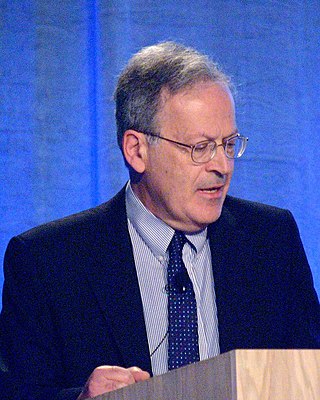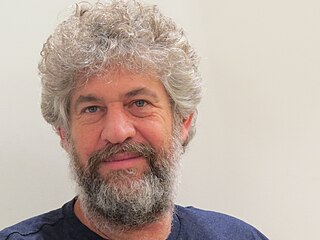Related Research Articles

Ronald Linn Rivest is a cryptographer and computer scientist whose work has spanned the fields of algorithms and combinatorics, cryptography, machine learning, and election integrity. He is an Institute Professor at the Massachusetts Institute of Technology (MIT), and a member of MIT's Department of Electrical Engineering and Computer Science and its Computer Science and Artificial Intelligence Laboratory.
In machine learning, boosting is an ensemble meta-algorithm for primarily reducing bias, and also variance in supervised learning, and a family of machine learning algorithms that convert weak learners to strong ones. Boosting is based on the question posed by Kearns and Valiant : "Can a set of weak learners create a single strong learner?" A weak learner is defined to be a classifier that is only slightly correlated with the true classification. In contrast, a strong learner is a classifier that is arbitrarily well-correlated with the true classification.
In computational learning theory, probably approximately correct (PAC) learning is a framework for mathematical analysis of machine learning. It was proposed in 1984 by Leslie Valiant.
In computer science, computational learning theory is a subfield of artificial intelligence devoted to studying the design and analysis of machine learning algorithms.

Charles Eric Leiserson is a computer scientist, specializing in the theory of parallel computing and distributed computing, and particularly practical applications thereof. As part of this effort, he developed the Cilk multithreaded language. He invented the fat-tree interconnection network, a hardware-universal interconnection network used in many supercomputers, including the Connection Machine CM5, for which he was network architect. He helped pioneer the development of VLSI theory, including the retiming method of digital optimization with James B. Saxe and systolic arrays with H. T. Kung. He conceived of the notion of cache-oblivious algorithms, which are algorithms that have no tuning parameters for cache size or cache-line length, but nevertheless use cache near-optimally. He developed the Cilk language for multithreaded programming, which uses a provably good work-stealing algorithm for scheduling. Leiserson coauthored the standard algorithms textbook Introduction to Algorithms together with Thomas H. Cormen, Ronald L. Rivest, and Clifford Stein.
Indeterminacy in concurrent computation is concerned with the effects of indeterminacy in concurrent computation. Computation is an area in which indeterminacy is becoming increasingly important because of the massive increase in concurrency due to networking and the advent of many-core computer architectures. These computer systems make use of arbiters which gives rise to indeterminacy.

Leslie Gabriel Valiant is a British American computer scientist and computational theorist. He was born to a chemical engineer father and a translator mother. He is currently the T. Jefferson Coolidge Professor of Computer Science and Applied Mathematics at Harvard University. Valiant was awarded the Turing Award in 2010, having been described by the A.C.M. as a heroic figure in theoretical computer science and a role model for his courage and creativity in addressing some of the deepest unsolved problems in science; in particular for his "striking combination of depth and breadth".

Vijay Virkumar Vazirani is an Indian American distinguished professor of computer science in the Donald Bren School of Information and Computer Sciences at the University of California, Irvine.

Christos Charilaos Papadimitriou is a Greek theoretical computer scientist and the Donovan Family Professor of Computer Science at Columbia University.

The Donald E. Knuth Prize is a prize for outstanding contributions to the foundations of computer science, named after the American computer scientist Donald E. Knuth.
Umesh Virkumar Vazirani is an Indian–American academic who is the Roger A. Strauch Professor of Electrical Engineering and Computer Science at the University of California, Berkeley, and the director of the Berkeley Quantum Computation Center. His research interests lie primarily in quantum computing. He is also a co-author of a textbook on algorithms.
Manfred Klaus Warmuth is a computer scientist known for his pioneering research in computational learning theory. He is a Distinguished Professor emeritus at the University of California, Santa Cruz.
Robert Elias Schapire is an American computer scientist, former David M. Siegel '83 Professor in the computer science department at Princeton University, and has recently moved to Microsoft Research. His primary specialty is theoretical and applied machine learning.
Piotr Indyk is Thomas D. and Virginia W. Cabot Professor in the Theory of Computation Group at the Computer Science and Artificial Intelligence Laboratory, Massachusetts Institute of Technology.

Constantinos Daskalakis is a Greek theoretical computer scientist. He is a professor at MIT's Electrical Engineering and Computer Science department and a member of the MIT Computer Science and Artificial Intelligence Laboratory. He was awarded the Rolf Nevanlinna Prize and the Grace Murray Hopper Award in 2018.
Dana Angluin is a professor emeritus of computer science at Yale University. She is known for foundational work in computational learning theory and distributed computing.

Noam Nisan is an Israeli computer scientist, a professor of computer science at the Hebrew University of Jerusalem. He is known for his research in computational complexity theory and algorithmic game theory.
In computational learning theory, Occam learning is a model of algorithmic learning where the objective of the learner is to output a succinct representation of received training data. This is closely related to probably approximately correct (PAC) learning, where the learner is evaluated on its predictive power of a test set.

Cynthia Diane Rudin is an American computer scientist and statistician specializing in machine learning and known for her work in interpretable machine learning. She is the director of the Interpretable Machine Learning Lab at Duke University, where she is a professor of computer science, electrical and computer engineering, statistical science, and biostatistics and bioinformatics. In 2022, she won the Squirrel AI Award for Artificial Intelligence for the Benefit of Humanity from the Association for the Advancement of Artificial Intelligence (AAAI) for her work on the importance of transparency for AI systems in high-risk domains.
References
- 1 2 3 4 MICHAEL KEARNS (2014). "ACM Fellows 2014". acm.org. ACM. Retrieved January 10, 2015.
- ↑ "Morgan Stanley Hires Ex-SAC Capital Artificial Intelligence Expert". Bloomberg News . 26 June 2018.
- ↑ "Amazon Scholar: Michael Kearns". 26 June 2020.
- ↑ David R. Kearns 1969 Guggenheim Fellowship Chemistry
- ↑ "Symposium honoring Clyde W. Kearns, Pioneer in insecticide toxicology". Pesticide Biochemistry and Physiology. 22 (2): ii–iii. 1984. doi:10.1016/0048-3575(84)90081-6.
- ↑ Eber, Irene. "Chen Shou Yi". School of Education Studies. Claremont Graduate University. Archived from the original on 31 August 2014. Retrieved 13 February 2021.
- ↑ Irene Eber. "Chen Shou-yi, 1899-1978". acmcgu.edu. Archived from the original on August 31, 2014. Retrieved January 10, 2015.
In the growth and development of Asian Studies on the West Coast, the Claremont Colleges and Professor Chen occupy a leading place.
- ↑ Michael Kearns (1988). "Thoughts on Hypothesis Boosting (Unpublished manuscript (Machine Learning class project, December 1988))" (PDF). Retrieved January 10, 2015.
{{cite journal}}: Cite journal requires|journal=(help) - ↑ Michael Kearns; Leslie Valiant (1989). "Crytographic limitations on learning Boolean formulae and finite automata". Proceedings of the twenty-first annual ACM symposium on Theory of computing - STOC '89. ACM. pp. 433–444. doi:10.1145/73007.73049. ISBN 0897913078. S2CID 536357 . Retrieved January 10, 2015.
- ↑ "News from the National Academy of Sciences". April 26, 2021. Retrieved July 4, 2021.
Newly elected members and their affiliations at the time of election are: … Kearns, Michael; professor, department of computer and information science, University of Pennsylvania, Philadelphia
, entry in member directory: "Member Directory". National Academy of Sciences. Retrieved July 4, 2021. - ↑ Columbia University. "Introduction to Computational Learning Theory". cs.columbia.edu. Retrieved January 9, 2015.